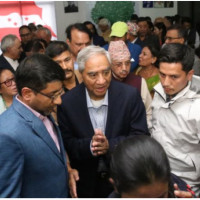- Wednesday, 15 October 2025
Gold dealers upset about taxes on jewellery
By A Staff Reporter,Kathmandu, June 2: Three major business federations representing Nepal’s gold, silver, gems, and handicraft sectors have jointly urged the government to immediately revoke the newly imposed taxes on jewellery.
Issuing a joint statement on Sunday, they said that the new measures would severely harm the industry, fuel illegal trade, and threaten thousands of livelihoods.
The Federation of Nepal Gold and Silver Dealers Association (Fenegosida), the Federation of Nepal Gold, Silver, Gems and Jewellery Associations (FNGSGJA), and the Federation of Handicraft Associations of Nepal (FHAN) expressed mixed reactions to the government’s recent budget announcement for Fiscal Year 2025/26.
President of Fenegosida Diyesh Ratna Shakya, of FNGSGJA Kisan Sunar and of FHAN Rabindra Shakya have signed the statement.
The federations welcomed the government’s provision allowing Nepali migrant workers to bring a fixed quantity of gold ornaments as personal belongings, and its commitment to facilitate bonded warehouse services and ensure gold and silver availability on partial advance payment for export-oriented industries.
But they raised strong objections to the new tax structure.
The budget has introduced a 2 per cent luxury tax on all jewellery, regardless of value, and a 13 per cent Value Added Tax (VAT) on ornaments embedded with diamonds and precious stones. Previously, the luxury tax applied only to jewellery worth over Rs. 1 million.
The federations warned that the tax hike would increase prices by up to 13 per cent, making Nepali jewellery significantly more expensive than in neighbouring countries and encouraging smuggling and illegal trade.
They also raised concerns about the disruption of resale guarantees, a key business model in the sector, while noting that the already sluggish jewellery market, hit by rising gold prices, would face further decline.
Through the statement, they urged the government to revoke the new taxes, introduce supportive laws and policies, conduct an impact assessment before implementing tax reforms, ensure international-standard hallmarking, resolve gold supply issues for small industries, and eliminate the 2.5 per cent TDS on exports.
Meanwhile, Nepal Foreign Trade Association (NFTA) welcomed the newly announced budget and said it is positive and collaborative towards the private sector.
It appreciated the provisions including plans to study the long-debated multiple VAT rates and to make customs valuation more realistic. “We believe replacing the reference pricing system with an automated valuation based on international price databases will enhance trade facilitation,” read a statement issued by the NFTA on Sunday.
The budget has also addressed major demands, such as eliminating advance income tax on food, grains, fruits, and animal products at customs points, and removing the requirement of a bank guarantee to obtain an EXIM code.
Additionally, the removal of the minimum tax for non-taxable transactions, support for overseas investments by Nepali entrepreneurs, reduction in SEZ land lease rates, and tax relief on IT service exports are seen as significant boosts to business confidence.
However, the Association criticised the steep hike in alcohol import duties, warning it may fuel smuggling across open borders.



-original-thumb.jpg)


-original-thumb.jpg)









